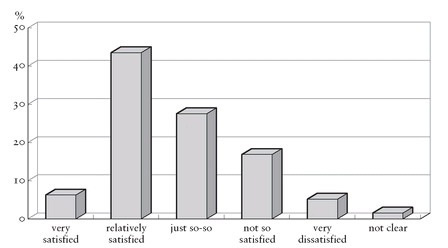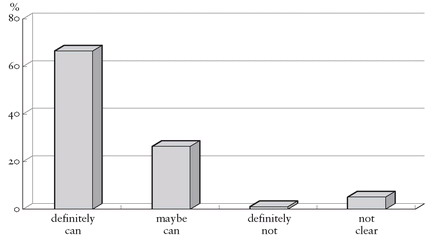A NEW POLITICAL POLE
Although the West finds it difficult to imagine a serious and viable alternative to its own arrangements, believing that ultimately all other countries, whatever their history or culture, are likely to converge on the Western model, China represents precisely such an alternative. To understand the nature of the Chinese polity — and how it differs from the West — one has to move beyond the present Communist regime and see China in a much longer-term context. Its underlying characteristics, as discussed in Chapter 7, can be summed up as follows: an overriding preoccupation with unity as the dominant imperative of Chinese politics; the huge diversity of the country; a continental size which means that the normal feedback loops of a conventional nation-state do not generally apply; a political sphere that has never shared power with other institutions like the Church or business; the state as the apogee of society, above and beyond all other institutions; the absence of any tradition of popular sovereignty; and the centrality of moral suasion and ethical example. Given the weight of this history, it is inconceivable that Chinese politics will come to resemble those of the West. It is possible, even likely, that in the longer run China will become increasingly democratic, but the forms of that democracy will inevitably bear the imprint of its deeply rooted Confucian tradition. Moreover, rather than seeing the post-1949 Communist regime as some kind of aberration from the norm of Chinese history, in many respects the Communist regime (especially the Deng and post-Deng era — more than the Maoist years) lies within the national tradition.
As China emerges as a major global power, it will present a different political face to that of the West. Since the Communist government has presided over a highly successful transformation of the country, it enjoys a great deal of internal prestige and support, as reflected in the self-confidence that the Chinese display about their future prospects (see Figures 51 and 52). As a result, for the next two decades — perhaps rather longer — the Communist Party is likely to continue in power. Given its achievements, it would not be surprising, moreover, if it did not also enjoy a revival in, and major enhancement of, its global reputation, a process already under way. [1292] In this context, we should think of China ’s Communist regime quite differently from that of the USSR: it has, after all, succeeded where the Soviet Union failed. It has also, since Deng, pursued an entirely different strategy, moving away from socialism and towards capitalism, including a significant dose of neo-liberalism. China’s socialist legacy has nonetheless left a deep and continuing mark on society: the destruction of the old feudal elite in the Maoist land reform (in contrast to India); an attachment to the notion of a classless society even though this is now in rapid retreat; a strong belief in egalitarianism even amongst the urban intelligentsia; and the continuing appeal of a socialist vocabulary, as in the recent commitment of Hu Jintao and Wen Jiabao to build a ‘socialist countryside’. [1293] Whatever the fortunes of the Communist regime, however, the main political impact of China on the world will be its Confucian tradition, its lack of a Western-style democracy or tradition, the centrality of the state and the relative weakness of any civil society that is likely to develop. Even a more democratic China will be profoundly different from the Western model.

Figure 51. Response of Chinese youth to the question, ‘Are you satisfied with your current living condition?’

Figure 52. Response of Chinese youth to the question, ‘Do you believe you can live a better life in the future?’
In short, China will act as an alternative model to the West, embodying a very different kind of political tradition — a post-colonial, developing country, a Communist regime, a highly sophisticated statecraft, and an authoritarian Confucian rather than democratic polity.
A CONTEST OF VALUES
The dominance of the West for the last two centuries has served to couch the debate about values overwhelmingly in terms of those that are civilized, a synonym for Western values, against those that are backward or reactionary, which has meant more or less all others, not least those of the Muslim world. In reality, values and cultures are far more complex and nuanced than this suggests. During the Cold War, the conflict over values was fought in highly ideological terms between capitalism and socialism. In the era of contested modernity, which will shape this century and well beyond, the debate over values will be rooted in culture rather than ideology, since the underlying values of a society are primarily the outcome of distinctive histories and cultures. Although on the surface these values may appear very different, in fact, there are often striking similarities. As John Gray has pointed out, there is nothing uniquely Western about tolerance, for example: ‘The Ottomans practised religious toleration at a time when we did not, as did the medieval Moorish kingdom in Spain and the Buddhist kingdom of Asoka in India. Toleration could thus be described as a universal value. It’s not peculiarly liberal, and it’s not even peculiarly modern.’ [1294] Nonetheless, there is often conflict and tension between the various values that different peoples hold dear. In a world of multiple and often competing values, it will be important to find a way of enabling and allowing such conflicting values to coexist. This will be a precondition, in fact, for a globalized world of contested modernity to live in a relatively peaceful and harmonious way. It will pose the greatest challenge of all to the West because the latter has become accustomed to thinking of its own values as the norm and regarding itself as justified in imposing these on other countries and insisting that they be accepted by the international community.
There are two senses in which China will be a major protagonist in the debate about values. First, China has strongly resisted Western arguments that have sought to impugn its international reputation in terms of human rights, notably its lack of democracy and the relative absence of free speech. China largely succeeded in resisting American efforts in the nineties to condemn it in these terms, mainly because it managed to mobilize the support of many developing countries. In opposition, China and its supporters argued that what should take priority were not political rights in the domestic context but economic and social rights in the international context. The argument was essentially over the differing priorities, interests and experiences of the developed countries on the one hand and the developing countries on the other. By the end of the nineties, that argument began to fade into the background as China’s growing influence began to shift the balance of power and the nature of the debate. Indeed, in the first decade of this century, it was the United States rather than China that found itself on the defensive in the debate over values because of its conduct in Iraq and its behaviour at Guantánamo.
The second sense in which China will be a protagonist is less immediately politically charged but in the longer run rather more important. As we have seen, the Chinese political order has a strong ethical component rooted in the Confucian tradition. [1295] In Chinese culture a powerful distinction is made between right and wrong, as reflected, for example, in the emphasis placed in children’s education at home and at school on their correct moral behaviour. Confucianism is essentially a set of precepts that prescribe appropriate forms of behaviour and in that sense, though secular rather than spiritual, is not dissimilar from major religious texts like the Bible and the Koran. These Confucian teachings underpinned the conduct of the state and the nature of Chinese statecraft during the dynastic period and are presently experiencing something of a revival. The continuing influence of Confucian culture is reflected in the highly moralistic tone that the Chinese government frequently adopts in its attitudes and pronouncements. [1296] The profound differences in the values of China (and other Confucian-based societies like Japan and Korea) in contrast to those of Western societies — including a community-based collectivism rather than individualism, a far more family-orientated and family-rooted culture, and much less attachment to the rule of law and the use of law to resolve conflict — will remain pervasive and, with China’s growing influence, acquire a global significance.